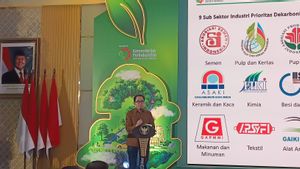The Indonesian Employers' Association (Apindo) regrets the existence of corporate punishment rules contained in the Criminal Code (UU KUHP). As is known, the House of Representatives (DPR) passed the Criminal Code Law on December 6, 2022.
Apindo Chairman Hariyadi Sukamdani said that punishment only applies to people, not an institution. It is also ironic, if the person commits a crime, but the company is also dragged into the law in it
"What is usually punished is people. This is an organization that wants to be punished," said Hariyadi when met at the Apindo Office, Jakarta, Tuesday, January 3.
He also said that before the enactment of the law, his party had submitted an objection to the government, but input from Apindo was not fully accommodated.
With the passing of the regulation, Hariyadi said business actors would try to be extra careful. According to him, business actors who are prone to this rule are business actors or companies that are often related to government projects.
"Perhaps, what has to be extra careful is companies that are directly related to the government," he said.
Nevertheless, Hariyadi hopes that the regulation will not have a significant impact on reducing investment in Indonesia or the business climate.
"I hope that these provisions will not (fully) reduce investment, yes," he added.
As is known, the Criminal Code's regulation emphasizes that corporate crimes can also be committed by the giver of orders, controlholders, or owners of corporate benefits (beneficial owners) who are outside the organizational structure, but can control the corporation.
There are two types of sanctions imposed on perpetrators of corporate crimes, namely the main sentence and additional crime. The main crime in corporations is a fine.
Meanwhile, the criminal fine for corporations, when referring to the regulation, was sentenced to a minimum of Rp. 2 billion for a crime of under seven years, over seven years to 15 years as much as Rp. 5 billion, and a maximum sentence of 20 years in prison. 50 billion.
Then, "If the fine is not paid in an indefinite amount of time, the prosecutor can confiscate the wealth or corporate income to pay off the fine."
Meanwhile, if the property is not sufficient to pay the fine, the corporation can be partially or completely frozen.
Meanwhile, additional penalties can be in the form of compensation payments, improvements due to criminal acts, implementation of obligations that have been fulfilled, fulfilling customary obligations, and financing job training.
The English, Chinese, Japanese, Arabic, and French versions are automatically generated by the AI. So there may still be inaccuracies in translating, please always see Indonesian as our main language. (system supported by DigitalSiber.id)













